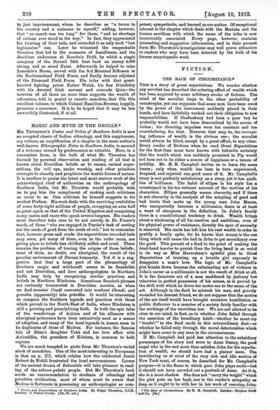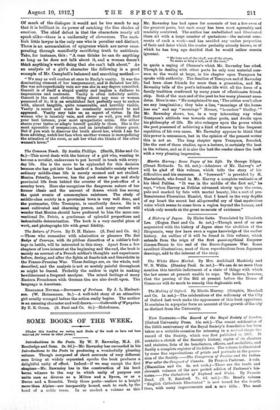FICTION.
THE RACE OF CIRCUMSTANCE.• THIS is a story of great expectations. We wonder whether any novelist has described the sobering effect of wealth which has been acquired by some arbitrary stroke of fortune. The mind of the moralist leaps to the other probability of catastrophe, yet one supposes that some men have been awed by the power of the instrument suddenly placed in their hands, and have faithfully worked out their obligation to new responsibilities. If Shaftesbury had been a poor boy he probably would not have been demoralized by the access of riches ; his directing impulses were too constant and too overwhelming for that. However that may be, the corrupt- ing influence of wealth is the obvious one ; the moralist would always be blind, except by a great effort, to any other. Every reader of Dickens when he read Great Expectations for the first time must have known with tolerable certainty that the wealth which was suddenly promised to Pip would not turn out to be either a source of happiness or a means of nobility. Mr. H. R. Campbell invites us to learn the same lesson ; only when wealth has been in turn experienced, despised, and rejected can good come of it. Mr. Campbell's story is not perfectly satisfactory as a story, yet it has quali- ties of brilliance. The habit of ellipse in his style has a counterpart in his too reticent account of the motives of his characters. Ellipse generally means obscurity, and if there is not obscurity in the analysis of the mingling of good and bad traits that make up the young man John Manxe, who unexpectedly becomes a millionaire, there is at least a want of sharpness in the definition. In John's family there is a constitutional tendency to drink. Wealth brings about a slackening of all his resolves and ambitions, even of his physical power of resistance, directly the spur of necessity is removed. His uncle has left him his vast wealth in order to gratify a family spite, for he knows that money is the one thing which will cause the bad in John to get ascendancy over the good. This pursuit of a feud to the point of making the dead-hand heavier to punish than the living hand is as weird in its way as Miss Haversham's spiteful plan in Great Expectations of training up a lovable girl expressly to disappoint a man's love. The logic of Mr. Campbell's plot breaks down because the culminating act of violence in John's career as a millionaire is not the result of drink at alL It is the ferocious act of a man maddened by jealousy but otherwise in perfect possession of his senses, as is proved by the skill with which he drove his motor-car to the scene of the act. Although in the dark he mistook his man, and gravely wounded his dearest friend, we do not suppose that the motive of the act itself would have brought excessive humiliation or public disfavour to a member of a society fairly familiar with the workings of the unwritten law. We are not allowed to be clear in our mind, in fact, as to whether John failed through the assertion of the hereditary habit—whether he must cry " touché !" to the dead uncle in this extraordinary duel—or whether he failed only through the moral deterioration which might have come to any man in the circumstances.
If Mr. Campbell had paid less attention to the subsidiary personages of his story and more to Anne Denny, the good angel who in the end more than satisfies John for his repudia- tion of wealth, we should have had a plainer issue. The bewildering va et vient of the very rich and idle section of New York must, of course, be described for Mr. Campbell's purpose—it is the flame to which poor John plays moth—but it should not have crowded out a portrait of Anne. As it is, she is a mere shadow. She does not "carry the weight" which the plot puts on her back, nor is the reader's sympathy as deep as it ought to be with her in her work of rescuing John.
' The 134C8 of Circumstance. By H. R. Campbell. London: Stephen Swift and Co. [6s.] Of much of the dialogue it would not be too much to say that it is brilliant in its power of catching the fine shades of emotion. The chief defect is that the characters nearly all speak alike—there is a uniformity of cleverness. The snob- bish little lawyer is the only one who is peculiar and distinct. There is an accumulation of epigrams which are never exas- perating through manifestly sacrificing truth to antithesis. Take, for instance, this : "A man thinks he can do anything so long as he does not talk about it, and a woman doesn't think anything's worth doing that she can't talk about." As an analysis of a girl's character the following is a good example of Mr. Campbell's balanced and searching method :—
" We may as well confess at once to Emily's vanity. It was the dominating element of her temperament, and it dictated her life. She was not superficially vain nor was she in any degree conceited. Conceit is of itself a stupid quality and implies a dullness to impressions and contrasts. Vanity is often infinitely subtle. Conceit is the most obvious thing about any man or woman possessed of it; it is an established fact perfectly easy to reckon with, almost tangible, quite measurable, and horribly visible. Vanity is secret and must be constantly ministered to and appeased. Vanity may take on an aspect of virtue. In the woman who is innately vain, and clever as well, you will find your best listener, your most sympathetic critic. She either shares your tastes or adapts herself quickly to them. She is the most agreeable of companions, and an invaluable dinner guest. But if you wish to discover the truth about her, which I am far from advising, watch her face when another woman is monopolizing the attention of the room, or ask her what she thinks of the other woman's lover."



































 Previous page
Previous page